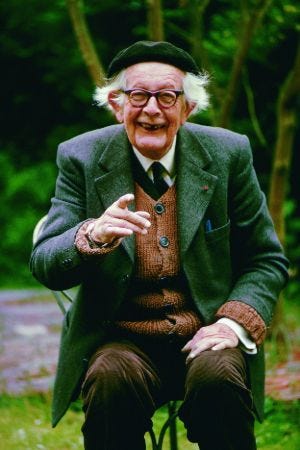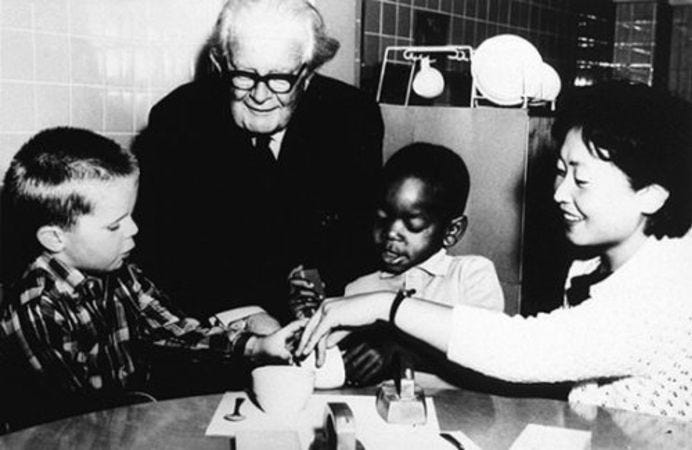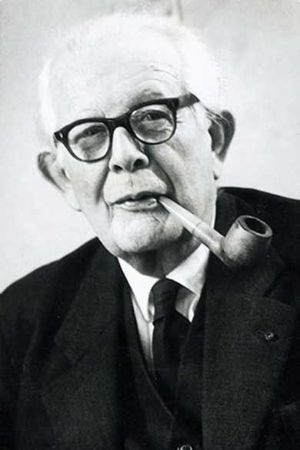Jean Piaget: Swiss Psychologist and Cognitive Development
Many of us have heard the name “Jean Piaget.” Jean was a Swiss psychologist who is always remembered for his great contribution to child development.
Piaget is the human who worked hard towards education in the child’s mindset. He explained the real importance of education in a child’s life.
Jean is most well known for his cognitive development theory that peers at kids to improve intellectually via childhood.
Here are some interesting facts about Jean Piaget.
Quick Facts of Jean Piaget
Full Name
Jean William Fritz Piaget
Nick Name
Tar-dieu (Slow God or Late God)
Birthdate
August 9, 1896
Age of Death
84 years old (1896–1980)
Birthplace
Neuchatel, Switzerland
Horoscope
Leo
Nationality
Swiss
Education
University of Neuchatel
University of Zurich
Occupation
Teacher
Author
Biologist
Researcher
Clinical Psychologist
Research
Children’s Cognitive Development
Marital Status
Married
Spouse
Valentine Chatenay (1923–1980)
Children
Laurent Piaget
Jacqueline Piaget
Lucienne Piaget
Net Worth
$1.2 Million
Social Media Presence
Website
Early Life and Family
Jean Piaget was born on August 9, 1896 in Neuchatel, Switzerland. His father, Arthur Piaget, was an educator of middle-age literature and a keen interest in local records and history.
Rebecca Jackson, Jean’s mother, was smart, powerful. However, Piaget usually got her a little neurotic, which defines an image that Jean told proved towards his interest in psychology, hence far from Pathology.

Piaget was an older kid of his parents. Jean was additionally independent, and he had a good sort of keen interest in nature.
He always loved collecting shells. Around the age of 10, Jean published his first and foremost ‘Paper.’ Now, you might have a question: what paper?
Jean Piaget published a single-page account of his looking for a sparrow. In Piaget’s early childhood, Jean Piaget always showed interest in biology and the natural globe. His zoology interest added up respect in the sector after Jean published different snail articles at the age of 15.
While Jean was 15 years old, the woman who was his nanny wrote a letter to Piaget’s family. There the nanny wrote that she apologized for faking up the story that the kidnappers tried to harm Jean when he was a baby.
However, Jean always thought about this story made by the nanny. Piaget knew it was fake; however, he started imagining the story.
In 1923, Piaget got eloped to Valentine Chatenay. The couple had three childrens.
Education of Piaget
Jean Piaget initiated his education at the University of Neuchatel, where Piaget studied at the University of Zurich.
Meanwhile, Jean Piaget was studying, and he also published two papers that are known as philosophical papers. After his graduation was over, Jean shifted to Paris from Switzerland.
After his shifting to Paris, Jean began tutoring at the Grange-Aux-Belles Street School. This school was only for boys. Alfred Binet was the person who looked and ran the school.
Piaget helped Binet, marking Ninet’s intelligence test. While this procedure was taking place, Piaget noticed that few young scholars usually gave wrong answers.
In the beginning, Jean didn’t take it seriously; however, Piaget later initiated noticing it after Jean started thinking about it. After this, Piaget concluded with a theory that young children’s physiology is much different from older people.

At this instance, Jean Piaget started to develop a world theory of Psychological development steps in which humans reveal the same shape of psychology in every stage of improvement.
Around the year 1921, Jean Piaget went back to Switzerland, his birthplace. He returned as the director of none other than Rousseau Institute, which was in Geneva.
Edward Claparede ran the institute. Jean had an idea of Claparede’s thoughts and plans that had the physiological concept’ fumble’ that were near mixed with ‘test and errors’ seen in human’s brain form.
From 1925 to 1929, Jean labored as a Physiological tutor, adding science philosophy at the University of Neuchatel.
In 1929, Piaget got the Director of the International Bureau of Education position and still became its head until 1968.
Jean was also mentioned in the second rand as the most influential psychologist during the 20th century in his 2002 study research.
Jean Piaget’s highlighted four stages of Cognitive Development
- The first stage is called the sensorimotor stage: in this stage, the newborn child commonly recognize the world according to their sense and motor movements
- The second stage is called the concrete operational stage: in this stage is the improvement of speaking power and the beginning of the symbolic play
- The third stage is called the concrete operational stage: in this stage, small children find it hard and struggle with the thinking capacity of theoretical
- The fourth stage is called the formal operational stage: in this stage, childhood enters into adulthood, which is above 12 years old here, the children adopt a non-touchable thought and reduce reason.
Important research of Jean Piaget
- Jean developed a conclusion that small kids usually have different thinking criteria
- Piaget also researched that individuals build their point of thinking and knowledge of the globe according to the communication among the individual’s ideas and experience.
Career History
Jean Piaget has given us four phases in theoretical research vellication;
- The model of sociological for development
- The intellectual model of biological for development
- The explanation of the model of logic for the development of intellectual
- The figurative thought study
What was Jean Piaget before he became a psychologist?
Before Jean Piaget was a psychologist, he was training in natural history, including philosophy. He also got a doctorate in the year 1918. Piaget got it from the University of Neuchatel.

After the completion, Piaget again took the post-doctorate training in Zurich from 1918 to 1919 in Paris from 1919 to 1921.
Sociological model of development
Jean was firstly known as a psychologist in the 1920s. Piaget researched the unseen phrase of kids’ mental state.
Jean then suggested that children shift from a stage of egocentrism to sociocentrism. To brief this, Piaget elaborated and added the advantages of physiological and clinical procedures to make what he named a semi-clinical discussion.
Jean initiated the discussion by questioning the kids’ systematized queries and turning on how the children replied. Piaget later queried a list of nonstandard questions.
Jean Piaget later realized that there was moderate development from beginning to systematic science and social communication and the dare to small children thinking through the much more modern children.
For more detailed information visit Hollywoodsbio.com
